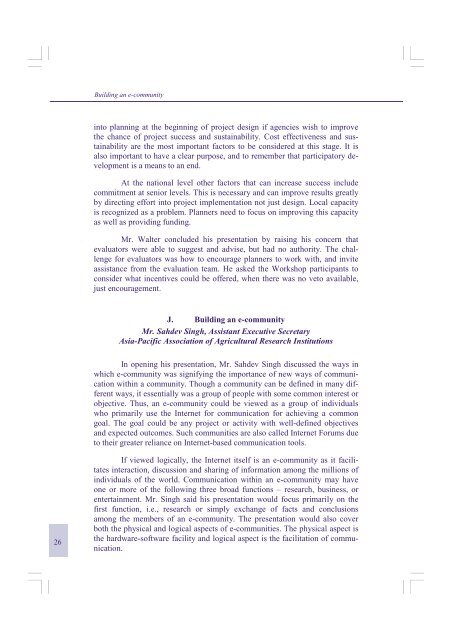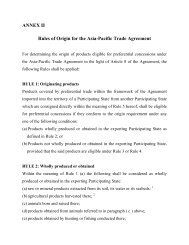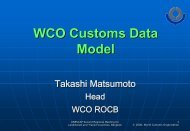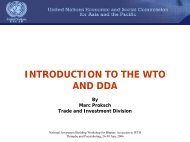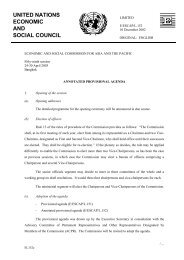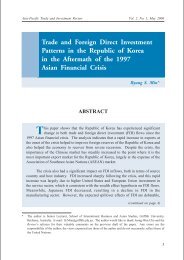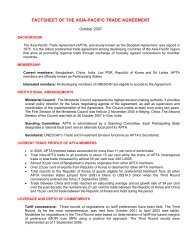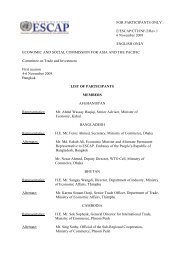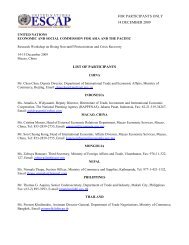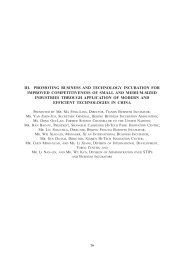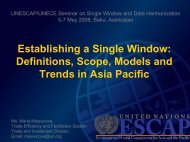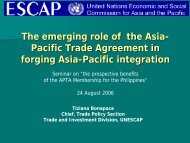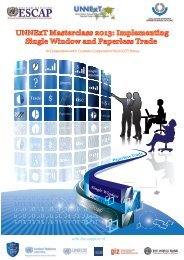Report of the Regional Workshop - Escap
Report of the Regional Workshop - Escap
Report of the Regional Workshop - Escap
Create successful ePaper yourself
Turn your PDF publications into a flip-book with our unique Google optimized e-Paper software.
Building an e-community<br />
into planning at <strong>the</strong> beginning <strong>of</strong> project design if agencies wish to improve<br />
<strong>the</strong> chance <strong>of</strong> project success and sustainability. Cost effectiveness and sustainability<br />
are <strong>the</strong> most important factors to be considered at this stage. It is<br />
also important to have a clear purpose, and to remember that participatory development<br />
is a means to an end.<br />
At <strong>the</strong> national level o<strong>the</strong>r factors that can increase success include<br />
commitment at senior levels. This is necessary and can improve results greatly<br />
by directing effort into project implementation not just design. Local capacity<br />
is recognized as a problem. Planners need to focus on improving this capacity<br />
as well as providing funding.<br />
Mr. Walter concluded his presentation by raising his concern that<br />
evaluators were able to suggest and advise, but had no authority. The challenge<br />
for evaluators was how to encourage planners to work with, and invite<br />
assistance from <strong>the</strong> evaluation team. He asked <strong>the</strong> <strong>Workshop</strong> participants to<br />
consider what incentives could be <strong>of</strong>fered, when <strong>the</strong>re was no veto available,<br />
just encouragement.<br />
J. Building an e-community<br />
Mr. Sahdev Singh, Assistant Executive Secretary<br />
Asia-Pacific Association <strong>of</strong> Agricultural Research Institutions<br />
In opening his presentation, Mr. Sahdev Singh discussed <strong>the</strong> ways in<br />
which e-community was signifying <strong>the</strong> importance <strong>of</strong> new ways <strong>of</strong> communication<br />
within a community. Though a community can be defined in many different<br />
ways, it essentially was a group <strong>of</strong> people with some common interest or<br />
objective. Thus, an e-community could be viewed as a group <strong>of</strong> individuals<br />
who primarily use <strong>the</strong> Internet for communication for achieving a common<br />
goal. The goal could be any project or activity with well-defined objectives<br />
and expected outcomes. Such communities are also called Internet Forums due<br />
to <strong>the</strong>ir greater reliance on Internet-based communication tools.<br />
26<br />
If viewed logically, <strong>the</strong> Internet itself is an e-community as it facilitates<br />
interaction, discussion and sharing <strong>of</strong> information among <strong>the</strong> millions <strong>of</strong><br />
individuals <strong>of</strong> <strong>the</strong> world. Communication within an e-community may have<br />
one or more <strong>of</strong> <strong>the</strong> following three broad functions – research, business, or<br />
entertainment. Mr. Singh said his presentation would focus primarily on <strong>the</strong><br />
first function, i.e., research or simply exchange <strong>of</strong> facts and conclusions<br />
among <strong>the</strong> members <strong>of</strong> an e-community. The presentation would also cover<br />
both <strong>the</strong> physical and logical aspects <strong>of</strong> e-communities. The physical aspect is<br />
<strong>the</strong> hardware-s<strong>of</strong>tware facility and logical aspect is <strong>the</strong> facilitation <strong>of</strong> communication.


